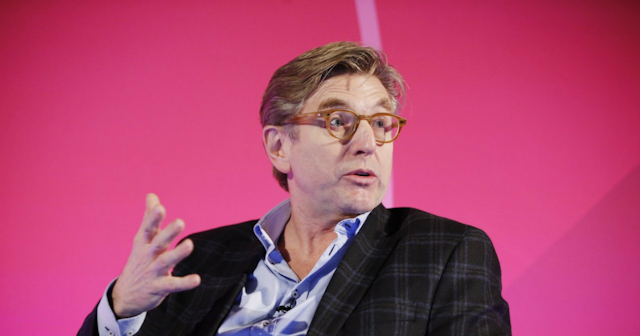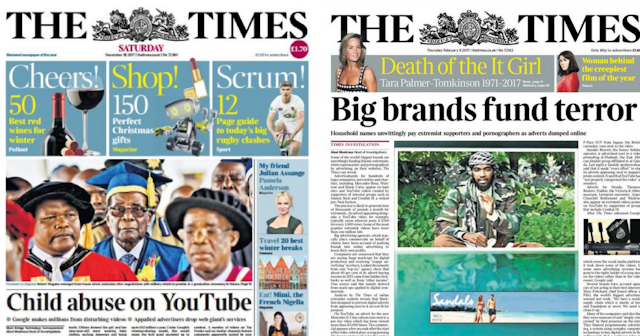What the industry really thinks about Keith Weed’s speech
Unilever’s Keith Weed dominated headlines this week with what many were quick to read as a threat to review ad spend with Google and Facebook. However, what on the surface seemed to be a bold statement of intent may not spur Google and Facebook into taking the action some industry observers have speculated they will.
At the IAB’s Annual Leadership Meeting in California on Monday (12 June) the marketing chief Unilever would only work with companies “committed to creating a better digital infrastructure” and sever ties with any platforms it deemed “unethical” (see video above).
Headlines proclaimed that Weed was using his estimated $2bn digital ad spend as a stick to beat Facebook and Google with, encouraging them to take further action to clean up what he described as “the swamp that is the digital supply chain”.
Naturally, comparisons were quickly drawn to the rallying call made exactly 12 months earlier by Procter & Gamble’s (P&G) chief branding officer Marc Pritchard. But many have argued that Weed's speech needs to be followed through with the same firm action if it's to invoke any sort of change.
While P&G almost immediately reviewed every single one of its agency contracts to weed out bad actors, Weed’s opus instead focused on media ethics and gave no clear outline on how Unilever intended to live up to his verbal commitments, or what is now expected from its agency partners.
Reaction from the crowd
One digital platform confirmed to The Drum it had been given a copy of Weed's speech ahead of time and, contrary to headlines, Unilever had given it no indication of its intention to cut spend.
Meanwhile, Brian Wieser, an analyst at Pivotal Research, assured that the comments provided on stage did not suggest that Unilever would be pulling its spend from the duopoly.
“If anything, [Weed’s] comments suggested that Unilever will stay the course so long as Facebook, Google and others continue to make efforts to improve their platforms," he said.
Liz Miller, senior vice-president the CMO Council, noted industry-wide frustration with the internet’s largest platforms, adding that Weed’s speech will prove to be “tone-deaf” unless there is some form of actions behind his words.
Comparing his stance to that of his rival, she added: “One of the most powerful things about Pritchard’s speech for me was his acknowledgement that part of the reason it has gotten to this was because of the brands not paying full attentions [to contractual terms, etc],” she added.

Sources present at the conference also told The Drum that while Weed’s speech certainly reinforced the drive for supply chain transparency and validation, the reaction among delegates (predominantly on the sell-side of the media chain) was “definitely not as big as P&G last year.”
The Drum also spoke to a number of agencies on Unilever’s roster. None indicated that the FMCG-giant had briefed teams beforehand or offered any guidance on whether they should interact with Google or Facebook any differently moving forward.
One agency exec who had worked with Unilever in the past suggested the surprise expressed in most of the coverage around Weed’s words was a reminder of how little control brands really have over Facebook and Google.
The source, speaking on condition of anonymity, said the message could also serve as a nudge to advertisers who haven’t invested in internal data capabilities and expertise, that they are effectively ceding power to these platforms.
Proclamations require follow-through
So while all parties publicly lauded Unilever and Weed’s public proclamations, there was also a vocal constituency that doubted the likelihood of a wholesale shift in philosophy, and business model, from the internet’s two-largest names.
Matti Littunen, an analyst at Enders, argued that the power is in advertisers’ hands when it comes to pressuring Google and Facebook to change their ways. Although a sustained squeeze from the very top to the very bottom of their advertising operations will be required if the ills over brand safety and fake news are to be remedied.
“It seems to be that FMCG brands are the ones who are most exposed to this and the most willing to move forward,” he noted. Littunen added that while it feels like the brand safety debate will be everlasting, Google and Facebook have – in some respects – bowed to brand demands by introducing more stringent third-party verification systems and investing in both human and AI moderation.
Speeches don’t move platforms, headlines do
However, speaking at an event hosted by The Drum on Thursday (15 February) Phil Smith, the general director of the Incorporated Society of British Advertisers (Isba) argued that digital giants were spurred into action by headlines and the advertiser reaction that followed.
Google was the focus of a series of damning investigations by The Times on how advertisers have funded everything from extremist content to child abuse videos on YouTube. And it was only when there was an “emotional reaction from consumers” that money began to shift out of these platforms.
Since then, he noted, brands have seen “a real acceleration” of pace from Google and Facebook.

Following on from the Times' exposé, advertisers “have been listened to,” according to Smith, who added that Google, as the world’s largest digital media owner, had "raised the bar on its content policies, monetisation and hand-vetting of Google Preferred.”
Pete Markey, marketing director at TSB, reasoned that Weed’s speech was not only a financial threat but a reputational one too. “We’ve seen the damage the front page reports on YouTube has done. That hurt them commercially, but it shouldn't take the extremes to do it. However, if there is momentum there that can’t go away; it has to continue.”
TSB’s Markey serves as a rare example among brands. It doesn't advertise on YouTube and the marketer said it won't until he is convinced by Google. “We’ve leveled out spending on digital and are monitoring until I have the confidence that it’s the right thing,” he added.

The CMO Council's Miller has argued that revoking all ad spend from ubiquitous online platforms was an “unrealistic” achievement for most marketers.
Taking action, she argued, doesn’t necessarily have to be the full suspension of spend. Unilever, for example, could modernise of the terms of its contracts with digital players, or apply a sustained pressure to reach more favorable outcomes in the long-term.
The duopoly don’t rely solely on big brands for ad spend
Even if giants like Unilever were to pull spend in protest – as other brands like Mars and Johnson & Johnson have done in the past – it isn’t likely to hit Google or Facebook where it hurts most: in the finance department.
The low impact of the brand safety crisis on digital giants’ bottom lines was best demonstrated in the most recent financial results of Google’s parent firm, Alphabet. In the aftermath of last year’s mass (but seemingly temporary) ad spend freeze on YouTube, Alphabet still posted an annual turnover of $110bn in 2017 – noting 23% growth on the previous year.
And it’s not big brands that keep the lights on at Google and Facebook, small and medium businesses funnel in plenty of investment too. Research dating back to 2015 pegged the number of advertisers actively spending with Google at 4m, while Facebook has confirmed that its own count sits at 5m.
More concerning for Google than losing a slice of Unilever's marketing budget, is that although some brands like Adidas instantly resumed spend with YouTube days after pulling it, there are businesses who have reported taking money out of the duopoly system without noting any downside.
That is according to Ian Armstrong, general manager for global advertising at Jaguar Landrover, who said: "There is evidence already that would support Unilever’s decision should they make it... Sometimes, you have to take a stand."
Ultimately the brand safety debate has now, as Weed pointed out in his speech, become a "consumer issue" as well as an industry one, which means Facebook and Google will be keen as ever to pay lip-service to the demands of large advertisers. It would take a concerted boycott by the world’s largest advertisers to drive any material change to platforms' policies or revenues.
And while Weed may have used his speech to make declarations of draining "the swamp that is the digital supply chain" for those reading between the lines it is clear he is interested in working in partnership with Google and Facebook to achieve this, rather than against them.

